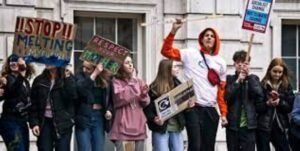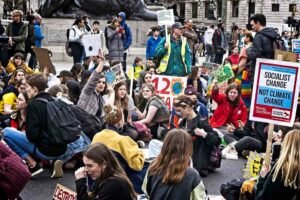At a trial in London on Friday, climate campaigner Greta Thunberg and the four other protestors were declared not guilty of violating the public demonstration laws. Their role in obstructing an oil and gas conference at the Intercontinental Hotel on October 17, 2018, during the Energy Intelligence Forum, was the basis for the allegations. The judge’s decision on Friday made it clear that Thunberg and her fellow activists did not break any laws because the police did not properly coordinate or inform the demonstrators of the public order.

New Protest Laws
The trial revealed how strictly protests are being policed, especially after the Conservative Government passed new legislation in May. These legislative reforms were put into effect, after a wave of environmental protests that disrupted even the infrastructure across the nation. The impact of these law revisions on activism and public protest was highlighted by Thunberg’s and her colleagues’ incarceration.
Testimonies given throughout the two-day trial indicated that starting around 7 am, a sizable contingent of demonstrators blocked the Intercontinental Hotel’s doors and exits. The police then used the Public Order Act to force demonstrators to stay in a specific location or risk being arrested. The judge countered that as demonstrators were not given a fair chance to comply before being arrested, the communication of this restriction was inadequate and ambiguous.
Greta Thunberg’s Advocacy and Acquittal Impact
As a triumph for Thunberg and the climate activists, the decision emphasises how crucial it is for law enforcement to follow due process and communicate clearly when acting during protests. The ruling has upheld the idea that people have the freedom to peacefully assemble and demonstrate as long as law enforcement follows procedural justice.

Because the activists targeted an event attended by oil and gas executives, this case also highlights the larger global discourse regarding climate activism and the conflict between environmental concerns and business interests. Thunberg, who is a well-known member of the climate movement, has continuously argued for immediate action to combat climate change. Her acquittal in this case is expected to intensify the conversation over the right to demonstrate in relation to environmental advocacy.
This decision establishes a precedent for the significance of law enforcement abiding by procedural standards, making sure that activists are given sufficient information and time to comply with orders, as the legal environment around protests continues to change. Greta Thunberg and her co-protesters’ acquittal highlights the difficulties and issues that lie at the foot of legal frameworks, the right to dissent, and climate advocacy. It also sheds light on their particular situation.












Comments 3